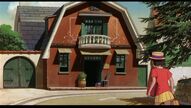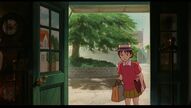"Listening to the Side" is a gloomy youth told in a gentle tone. If it tells the story warmly, it mostly comes from the slow storytelling, and thus the spice of life that has been inserted so much.
I am already familiar with Ghibli's delicate style of painting, but this pure fairy poem theme should still be remembered in particular. Such a simple story can touch people's hearts, one is the proper grasp of the characters' psychology by the music, and the other is the heart-wrenching sense of the past created by the pictures. Incomparably appropriate belongs to the past of youth. Most people are like this, spending their childhood and adolescence in a small community or small town. Society restricts the activity space of young people out of the protection of minors. Maybe you didn't feel the difference in childhood, but when you reach adolescence when your self-consciousness grows wildly, what kind of poverty is the fanatical heart in that old familiar circle of life! From the point of view of those who grew up and left that environment, the simple and poor environment has become a nostalgic sanctuary, commemorating how simple we were. Most viewers who have grown up will look at these dilemmas for teenagers with an appreciative eye. What we appreciate is not the predicament but the youth in the depths of the years.
The film has several scenes of life that touched me very much, and people with similar growth trajectories can't help but resonate.
1. Hot summer. Walking on the way to school under the bright sun may be a collective memory of the student class. DiDi came out of the dark corridor in 5 minutes and 33 seconds, and the sun and the shade were mixed outside. In the subtropical hot summer, the cicadas chirped all of a sudden in my heart. The soundtrack is in a high-spirited tone. This is not to imitate the mood of the middle school students in Xia Lian's dog days, but to imitate everything about youth that stirs up in the hearts of the audience when they see this scene.
2. The iron railings on the road to school (passable by pedestrians, but not by cars), the front yard of the house with dogs, and the wooden road guardrails on both sides when going up the steps are very life-like, and they are all treated very old.
3. Climbing slopes, small roads, crossing streets and alleys, there are almost no passers-by in the quiet. How many tears of joy and sadness have been shed on the road that no one pays attention to, and how many ups and downs of spiritual legends have been witnessed.
At 4.49 minutes and 15 seconds, when Didi entered the back door of the store, he glimpsed the city scenery. Looking down, he saw Shengsi standing under the roof tile, and Didi said, "I feel the wind is blowing." Only at that age can I be so sensitive to the little pleasures and beauty in life and be moved by it for a long time.
5. Hurry up on a rainy day. The dim sky made the streets even older.
6. The school rooftop. Every rooftop has the potential to be a wonderful secret base. The scenery is very good, and the high winds are very refreshing in summer, which is simply bursting with pride.
The scene and the mood are the same. Three views of the sky, at the back door of the store, on the top of the building, and at the last high hill, the natural beauty and beauty are touching, and they also play a key role in the plot structure. Annoyance is also the beginning of the change in attitude towards Shengsi; on the roof is the climax of the story, the relationship between the two has developed to a very good point, but parting may bring the story into new contradictions; Gaogang Sunrise is the end revealing . The image of the sky represents both the broadness of the heart and the grand prospect of the future, just like Seiji and Didi in the film who work diligently and look forward to achieving success. The restlessness was expressed when Didi resisted learning, saying that her sister "it's not a big deal to go to university". The way out for young people is definitely an extraordinary one. The sky is far away and inaccessible, which is in stark contrast to aspirations. The poor environment in which the teenager lives, his own weak abilities, and the irresistible external domination make even himself feel that his life and dreams cannot be grasped. Where is the relationship, the long and arduous road to success.
Didi heard her grandfather persuaded her not to be impatient, work hard, and could no longer bear to cry "so scared, so scared". Young people's rush for quick success is not only impetuous, but their anxiety is that they are too powerless and too eager to get it. You can only feel at ease when you catch it at once. Ask them to be patient, ask them to wait, they don't know what their fate will be in the next moment. The trajectory of life is so ironic that people have nothing and are unable to get them when they need them most.
Even with a clear confession at the end, they failed to achieve a reassuring love. Just like Didi crying after walking off the roof of the school, the distance to a foreign country is too difficult, and the difficulties of life have not yet fully unfolded. The music is lyrical and quiet, like a silent soothing of the vicissitudes of life.
Standing in the distance of youth, watching "Listen to the Side" is like revisiting the old negatives and scars. Time has taken away the pain, and added the relief of calming down and the tender feeling of sadness.
View more about Whisper of the Heart reviews










